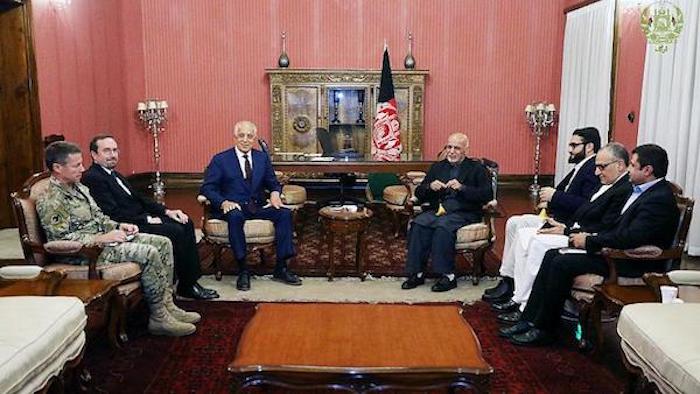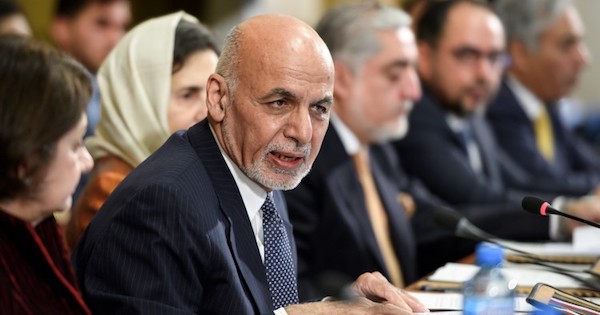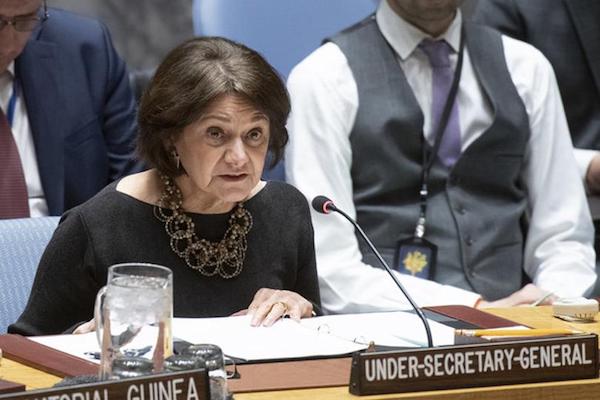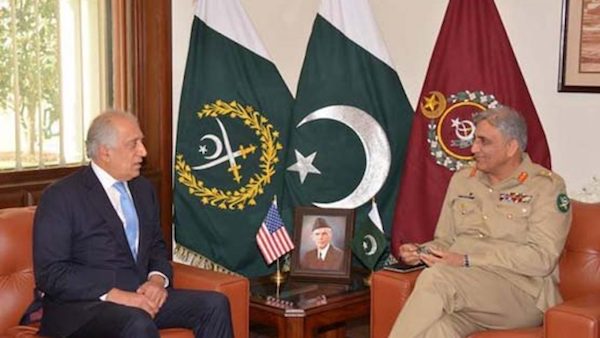America is abdicating its obligation of bringing a responsible end to “wrong wars”. it has decided to pull out its troops from Syria and Afghanistan. A lot had happened with regard to evolving Afghan peace process during 2018, most of the activity is not yet in the public domain. Hopefully, the Pakistan government would stand on its feet firmly to safeguard its core national interests and would not buckle under American pressure to offer strategic concessions in exchange for paltry gains like previous governments which had to deal with earlier portions of Afghan crisis. The Americans are in an indecent hurry, this should not tailspin Pakistan into a state of panic.
With recent American trend of walking away from earlier international treaties, they can no longer be trusted with new ones. Pakistan should insist for appropriate international guarantees, both within and outside UNSC framework. All six immediate neighbours of Afghanistan should be made part of the evolving peace agreement. There should be a multilateral mechanism to oversee the implementation of agreement leading to transfer of control of Afghanistan’s destiny to the Afghan people through a UN supervised presidential and parliamentary elections in which the Taliban also participate as a political entity.
The Trump administration is aiming to strike a deal with the Taliban by April next year or before the Afghan presidential elections. The Taliban, who control over 60 percent of the Afghan territory, want the US forces to leave Afghanistan. Representatives of the Taliban, the US and several Asian countries gathered in the UAE on December 17-18. The talks were supposed to last three days, as per earlier official announcements, but neither side explained what prompted them to abruptly end the process. Afghan government officials also travelled to the UAE, but were not invited into the meeting. They met with other delegations and said that efforts to join the discussions continued.
Prime Minister Imran Khan, publicly took credit for facilitating the “peace talks” and reiterated that his country will do everything within its power to further the Afghan peace process. The US spokesperson said a recent letter from President Donald Trump to Prime Minister Imran Khan “emphasized that Pakistan’s assistance with the Afghan peace process is fundamental to building an enduring US Pakistan partnership”. He added “We welcome any actions the Pakistani government takes to advance security, stability and cooperation in South Asia, including the fostering of negotiations between the Taliban, the Afghan government and other Afghans”.
Taliban spokesman Zabihullah Mujahid, in a separate statement, said, “Future negotiation meetings shall continue after deliberations and consultations by both sides with their respective leaderships”. Mujahid said the Taliban dialogue was exclusively with the US and “the focal point” of discussions with U.S. interlocutors was the withdrawal of all US and NATO forces from Afghanistan. Taliban officials also urged US interlocutors to take into consideration “humane treatment of [insurgent] prisoners and their freedom” from Afghan jails. Khalilzad urged the Taliban to release an American professor and his Australian colleague who were kidnapped more than two years ago. Kevin King, 60, and Timothy Weeks, 48, from Australia were teaching at Kabul’s American University of Afghanistan (AUAF) before gunmen took them hostage near the campus in August 2016.
Taliban envoys presented “documented information and proof to the participants about indiscriminate bombings against civilians and demanded its immediate halt”. For their part, Afghan, the US and the UN officials accuse the Taliban of causing a majority of Afghan civilian casualties during battlefield and other insurgent raids.
Craig Nelson and Asa Fitch reported for Wall Street Journal that “While US special envoy Zalmay Khalilzad held talks with a high-level Taliban delegation in one hotel in Abu Dhabi on December 18, representatives of the Afghan government stewed in another waiting for a summons to hold indirect talks with the Taliban officials. By late evening, the government officials were still waiting”. Some delegates saw that as a potential route to formal talks to end the war in Afghanistan. The three-day parleys in Abu Dhabi are said to have made progress, despite the insurgent group insistence that negotiations should only focus on withdrawal of the US forces from Afghanistan.
Talks were attended by representatives of the Afghan Taliban, the US as well as officials from Pakistan and Saudi Arabia. This time Taliban’s military and political leaders attended the negotiations. Previously, Taliban were represented only by their political office in Qatar. This has renewed hopes of a possible peace deal. The presence of the Taliban leaders like Mullah Amir Mutaqi, Qari Yahya, Mullah Mohibullah Hamas and Mullah Abbas Akhund at the UAE talks suggests seriousness of the insurgent group towards a negotiated settlement.

The UAE government said it hosted the US-Taliban reconciliation talks in Abu Dhabi, with the participation of Saudi Arabia and Pakistan. “The two-day Afghan reconciliation conference fructified in tangible results that are positive for all parties concerned,” the statement said. According to the statement, another round of talks would be held in Abu Dhabi to complete the Afghanistan reconciliation process. According to the UAE’s official news agency “Saudi Arabia and the UAE extend their thanks to Afghan President Ashraf Ghani as well as the US, Pakistani and Taliban delegations for their effective participation and support for ensuring the success of the conference”. No further details have been available as to what exactly transpired in the Abu Dhabi meetings.
Zalmay Khalilzad, who led the US side at the talks twittered. “Had productive meetings in the UAE with Afghan and international partners to promote intra-Afghan dialogue towards ending the conflict in Afghanistan”. After conclusion of the talks, Khalilzad flew to Islamabad and Kabul and held an important meeting with the army chief General Qamar Javed Bajwa and Afghan leadership. ISPR Director General Major General Asif Ghafoor said regional security and Afghan peace process were discussed during the meeting. He said Khalilzad appreciated Pakistan’s efforts for Afghan peace process while General Qamar reiterated that peace in Afghanistan is important for Pakistan and assured continued efforts for bringing peace and stability in the region.
The Taliban spokesperson claimed that discussions focused on the complete withdrawal of the US forces from Afghanistan. The spokesperson dismissed reports that any proposal was under consideration regarding the setting up of interim government in Afghanistan or a 6-months ceasefire. Many observers believe that the Taliban statement may just be meant for its foot soldiers and elements who are not in favour of striking a peace deal with the US or Afghan government. Earlier, Taliban spokesperson Zabihullah Mujahid had said that the talks had begun and could take some time.
The latest push for a peace deal came after President Donald Trump wrote a letter to Prime Minister Imran Khan, seeking Pakistan’s help for the negotiated settlement of the Afghan conflict. Nevertheless, there is unanimity of opinion that any peace process would be long and complicated, given the war duration and its regional players, including Russia and Iran as well as India’s spoiler role. Above all President Trump’s erratic behaviour could also become obstructive. Especially as Trump has stepped into a complicated legal case, tweeting that he would review the case of Major Mathew Golsteyn, a Green Beret charged by the Army in the killing of a man linked to the Taliban.
After criticising and blaming Pakistan for months, the Trump administration had formally reached out to Islamabad seeking its help for the Afghan peace process. The reason the US sought seeking Pakistan’s help stems from the fact that its recent rounds of talks with the Taliban could not yield the desired results.
Diplomatic efforts to resolve the conflict have intensified. Taliban have refused to deal directly with the internationally recognized government in Kabul, which it considers an illegitimate foreign-imposed regime.
Taliban, say the presence of international forces in Afghanistan is the main obstacle to peace. Even as the peace process gathers momentum, fighting has continued with heavy casualties on both sides. President Ashraf Ghani’s national security adviser, Hamdullah Mohib, stated that Afghan government had not taken part directly in the talks, however a team from Kabul met US and Saudi officials in the UAE.
Ghani has formed a team to negotiate peace with the Taliban but the movement said in a statement that senior Taliban members had no plans to meet the representatives of the Afghan government in the UAE. “The talks in UAE will happen with the US envoy in the presence of representatives of some other countries”, said Mujahid in a statement.
While establishing direct contacts with the Taliban, US officials have stepped up efforts to win support from countries with an interest in Afghanistan, including Pakistan and Saudi Arabia. Western diplomats said the decision to move the venue of the talks from Doha to the UAE underscored efforts to involve Saudi Arabia, more closely in the process and to exert influence on its ally, Pakistan. In recent months Saudi Arabia has offered a $6 billion rescue package to Islamabad as the country attempts to plug its rapidly deteriorating finances. “At this juncture, if Saudi Arabia tells Pakistan to support the Afghan peace process then there is no way that Pakistan can ignore it”, said a senior Western diplomat in Kabul.
Pakistan Foreign office welcomed a new round of talks between the Afghan Taliban and other international stakeholders. “Along with international community and other stakeholders, Pakistan is committed to peace and reconciliation in Afghanistan” said the FO Spokesperson on Twitter: “Talks are being held in UAE. We hope this will end bloodshed in Afghanistan and bring peace to the region”.

Earlier, the Geneva Conference on Afghanistan was co-hosted by the Government of Afghanistan and the UN “to renew their partnership and cooperation for Afghanistan’s peace, prosperity and self-reliance”. Meet was attended by delegations from 61 countries and 35 international organizations, and representatives of civil society, the private sector and the media. The Geneva Conference was a midway review between two pledging conferences The Brussels Conference on Afghanistan (2016) and the next pledging conference expected to be held in 2020.
Geneva conference was crucial in measuring results against the $15.2 billion committed by the international community for Afghanistan in 2016. Afghan government claimed fulfilling 39 percent of its commitments with the international community under the National Framework of Peace and Development. At the midpoint of Afghanistan’s Transformation Decade (2015-2024), participants noted the progress that has been made on Afghanistan’s path to self-reliance, but recognized that serious challenges including insecurity poverty and corruption persist. To this end participants reaffirmed their commitment to mutual accountability and delivery of mutually agreed commitments by both government and the international community.
The Afghan government’s delivery of its commitments was envisaged as key to sustained international support. The participants acknowledged progress in many of the reform areas and agreed that much still needs to be done, including enhancing inclusive economic growth; reducing poverty; creating employment; fighting corruption; empowering women; and improving governance rule of law and human rights. It adopted the Geneva Mutual Accountability Framework (GMAF) with measurable reform objectives and commitments for the government and the international community for 2019-2020 aligning the GMAF deliverables with the Afghanistan National Peace and Development Framework (ANPDF) and its National Priority Programmes (NPPs).
Afghan government agreed to meet six benchmarks: holding transparent, fair and credible parliamentary elections; advancing anti-corruption effort; reforming the security sector; meeting IMF benchmarks, furthering private sector development and finalizing implementation plans for the NPPs. Participants expressed concern that the benchmarks on anti-corruption and on elections with respect to its technical conduct have not been met fully and requested a renewed focus on these important benchmarks.
Delegates were of the view that there is a new opportunity to seek peace in particular in light of the government’s peace offer in February 2018. The government’s offer to the Taliban of talks without preconditions has enhanced regional cooperation and bolstered a national, regional and international consensus providing a unique opportunity for a negotiated end to the conflict. Participants emphasized that peace must be underpinned by serious efforts and reform, as well as inclusive economic and social programs. And to end the suffering of civilians and bring about opportunities for growth and prosperity. It was opined that peace must also be based on a broad political consensus involving all segments of society. Conference reconfirmed that Afghan-led and Afghan-owned peace processes must be supported by coordinated efforts of regional countries and the international community. Conference welcomed the holding of the first Afghan-led parliamentary elections secured by ANDSF in October 2018, and praised the significant number of citizens who voted despite intimidation. It called for effective preparations of presidential elections in 2019 to ensure maximum transparency, credibility, participation, and security.
President Ashraf laid out what he termed a “roadmap” for the talks and listed the principles that he said must form the backbone of any agreement. He announced a 12-person team led by presidential chief of staff Abdul Salam Rahimi for prospective peace talks with the Taliban. The Afghan government, Western diplomats and United Nations officials have in recent weeks raised hopes of finally reaching a deal.

In a message read to the conference from UNSG Antonio Guterres, deputy under-secretary general Rosemary A. DiCarlo said: “We may have a rare opportunity to move to direct peace talks between the Afghan Government and the Taliban”. “We must not miss it”. The European Union foreign affairs chief, Federica Mogherini, told the conference that the bloc believes “it is time for concrete talks about peace to begin”. The EU is prepared to act as the “guarantor” of the negotiations, she added.
On combat side, foreign occupation forces continue their rampage. NATO announced on November 28 that it was investigating an airstrike in south eastern Afghanistan that might have killed civilians, with unverified reports of women and children among the dead. Taliban have intensified attacks on Afghan forces, inflicting record casualties even as the United States ratchets up efforts to engage them in peace talks.
While Afghan leadership was looking for peace in Geneva Ministerial Conference on Afghanistan back home there were two back-to-back raids on occupation forces two on the US and one on the UK assets. Four Americans soldiers were killed, taking the number to 12 during this year more than 2,200 American soldiers have been killed in Afghanistan since 9/11. Since the start of 2015, when Afghan forces assumed lead in combative operations, 58 Americans have been killed as compared to 30,000 Afghan police and soldiers. At least twelve people were killed after a massive blast outside a British security company’s compound in Kabul on November 28; the attack claimed by Taliban was the latest violence to target the Afghan capital. Blast was a car bomb targeting a compound which houses G4S, a private British security company in east Kabul. Health ministry spokesman Wahid Majroh told AFP “10 dead, 19 wounded have been evacuated from site,” he did not mention victims’ nationalities.
Attack came just hours after Afghan President Ashraf Ghani announced the formation of a team for prospective peace talks with the militant group as the United Nations (UN) renewed calls for direct negotiations between Kabul and the insurgents. And on November 20, at least 55 people were killed when a bomber blew himself up in the middle of a banquet hall in one of the deadliest attacks in Afghanistan this year. The violence came as the Taliban intensify pressure on Afghan security forces, even as the international community ramps up efforts towards talks.
In November 2018, President Ashraf Ghani had said, it was “not a question of if, but when” an agreement would be reached with the Taliban. And US Special Envoy on Afghanistan, Zalmay Khalilzad has said he is “cautiously optimistic” for an end to the conflict. Khalilzad is spearheading efforts to strike a peace deal with the Taliban before Afghanistan presidential election slated for April. He has held talks with the Taliban in Qatar earlier this month and visited nearly half a dozen capitals. If his effort fizzles out then Presidential elections may be put off.
Notwithstanding the optimism Afghan peace may stay elusive unless occupation forces offer concrete concessions including firm timeframe for the departure of last foreign soldier and substantial restructuring of Afghan constitution. Indecent hurry towards abandoning Afghanistan, yet once again is clearly visible in all recent American actions. While a number of earlier more powerful peace initiatives got derailed on one flimsy reason or the other Trump administration officials are struggling to offset one fine morning tweet by President Trump notifying immediate and unconditional American military pull-out from Afghanistan. In the mean while regional countries are preparing to face the consequence either way orderly or disorderly American troops withdrawal. The Moscow conference and December 15 trilateral meeting between China, Afghanistan and Pakistan leading to a joint MoU to fight terrorism conjointly point towards that direction.




